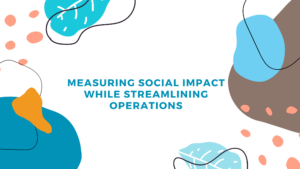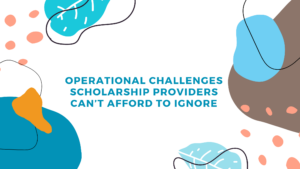
Measuring Social Impact While Streamlining Operations
Schedule a Demo View Interactive Tour A Deep Dive into How Brands and Foundations Can Power Purpose-Driven, Data-Backed Scholarship and Grant Programs
Successfully managing an award program is like conducting a grand orchestra – each instrument, or in this case, each process, plays a pivotal role. From the initial promotional stages to the thrilling culmination at an awards gala, meticulous planning and execution are crucial. Here’s your complete playbook for efficiently managing the award program. Looking for the Ultimate Guide to Running A Member Recognition Award – Check this out.
Deploying Landing Pages: Create a dedicated landing page that outlines the award’s purpose, eligibility, timelines, and benefits. This serves as the program’s online focal point.
Marketing Material: Design eye-catching digital brochures, posters, and email campaigns that encapsulate the award’s essence, inspiring individuals and institutions to participate.
After igniting the initial spark with effective marketing, the real work begins. Central to the success of an award program is the engine that powers it, your award management software. Choosing the right software can make the difference between a smoothly-run program and a logistical nightmare. Platforms like Reviewr have revolutionized how award programs are managed. But how do you decide which software to choose? Here are some crucial features to look for:
Monitoring Nominations: Utilize dashboards to track incoming nominations in real-time, assessing both quantity and quality.
Reminder Mechanisms: Automated emails or notifications can gently nudge those who initiated but haven’t completed their nominations, ensuring maximum completion rates.
Program Updates: Consistently communicate with participants. Send milestone updates, essential dates, and any changes in the process.
Committee-Based Scoring: Designated teams, often experts in specific categories, assess corresponding nominations. It ensures that nominees are evaluated by those most versed in their field.
Automatic Assignments: Software algorithms can randomly assign nominations to judges. This can be based on:
Manual Assignments: In specific scenarios, program managers, with intricate knowledge about judges and nominees, might need to handpick assignments, ensuring each nominee gets a fair and knowledgeable assessment.
Progress Dashboard: Implement tools that allow for real-time tracking of each judge’s progress.
Automated Reminders: Periodic automated emails can serve to remind judges of their pending evaluations, ensuring punctuality.
Generating Preliminary Results: Once evaluations are in, use software tools to collate scores and rank nominations.
Final Deliberation: Top candidates can then be presented to a senior panel for final discussions and selection, ensuring a multi-tiered, thorough evaluation.
Email Announcements: Dispatch beautifully designed emails, announcing the winners and congratulating all participants.
Website & Social Media: A simultaneous announcement on your website and across social media channels ensures widespread coverage.
In-Person Awards Gala: Often embedded within an annual conference, this gala is the zenith of the program. Celebrate winners with certificates, trophies, or plaques. Incorporate keynote speeches, testimonials, and a showcase of the journey, making it a memorable event.
Managing an award program is an intricate dance of marketing, monitoring, evaluation, and celebration. With meticulous planning, the right tools, and constant communication, you can ensure that your award program is not just successful but also memorable for everyone involved. Each step, when executed with precision and care, culminates in a celebration of excellence that reverberates across your industry.

Schedule a Demo View Interactive Tour A Deep Dive into How Brands and Foundations Can Power Purpose-Driven, Data-Backed Scholarship and Grant Programs

Schedule a Demo View Interactive Tour Insights from 500 scholarship provider interviews Bridging the Gap Between Mission and Execution Scholarship programs
